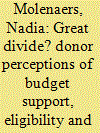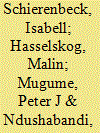| Srl | Item |
| 1 |
ID:
095174


|
|
|
|
|
| Publication |
2010.
|
| Summary/Abstract |
This article reviews the EU's distinctive approach to good governance, based on policy dialogue and incentives, in light of the significant transformations that have occurred in EU development policy since the early 2000s. The argument made here is that only when the EU decided to act as a single actor was it possible to agree on a harmonised approach to good governance. By doing so, the EU sought to promote aid effectiveness and at the same time raise its profile in international politics, thus challenging the leadership of the World Bank and of the USA. It is concluded that not only has the gap between the EU's lofty ambitions and the implementation record remained wide, but also that the search for better co-ordination between European donors has resulted in decreased policy space for developing countries.
|
|
|
|
|
|
|
|
|
|
|
|
|
|
|
|
| 2 |
ID:
113354


|
|
|
|
|
| Publication |
2012.
|
| Summary/Abstract |
Budget Support (bs) has been considered the aid modality that best realises the Paris Declaration principles of alignment, harmonisation and respect for recipient ownership. In design the modality has a very strong technocratic focus, and the oecd/dac has endorsed the idea that bs should be delinked from broader political concerns. In reality, however, donors do use bs to leverage more and better democratic governance. This political use of bs is not limited to exceptional moments when the political situation seriously deteriorates in certain countries. This article shows that such use is grounded in fundamentally different visions and policies that donors hold regarding the scope of leverage for bs. Such starkly diverging interpretations of which reforms bs can 'buy' undermine the objectives the modality was designed to achieve.
|
|
|
|
|
|
|
|
|
|
|
|
|
|
|
|
| 3 |
ID:
153142


|
|
|
|
|
| Summary/Abstract |
A paradox in current international development cooperation is comprised by the simultaneous insistence on national ownership and far-reaching donor involvement through policy dialogue. In order to better understand this combination of a strong ownership ideal and extensive donor presence, this article explores how national and external actors portray the process of formulating and revising development policies and programmes in an aid recipient country. The study is based on original empirical material from national as well as external actors involved in the aid relation in Rwanda which, despite heavy aid dependence, is known to have achieved relative policy independence. Analysed in relation to three strands of critical thought in previous research, findings show that, in Rwanda, the very top political leadership is actively involved in initiating and formulating policies; that there are instances of negotiation as well as strong disagreements between national and external actors; and that, rather than donors seeking to retain control, Rwanda is depicted as setting its own agenda and effectively managing its donors. The paradox of an ownership ideal combined with donor involvement is thus met by an apparent tendency among national as well as external actors to emphasise national ownership while toning down donor influence.
|
|
|
|
|
|
|
|
|
|
|
|
|
|
|
|